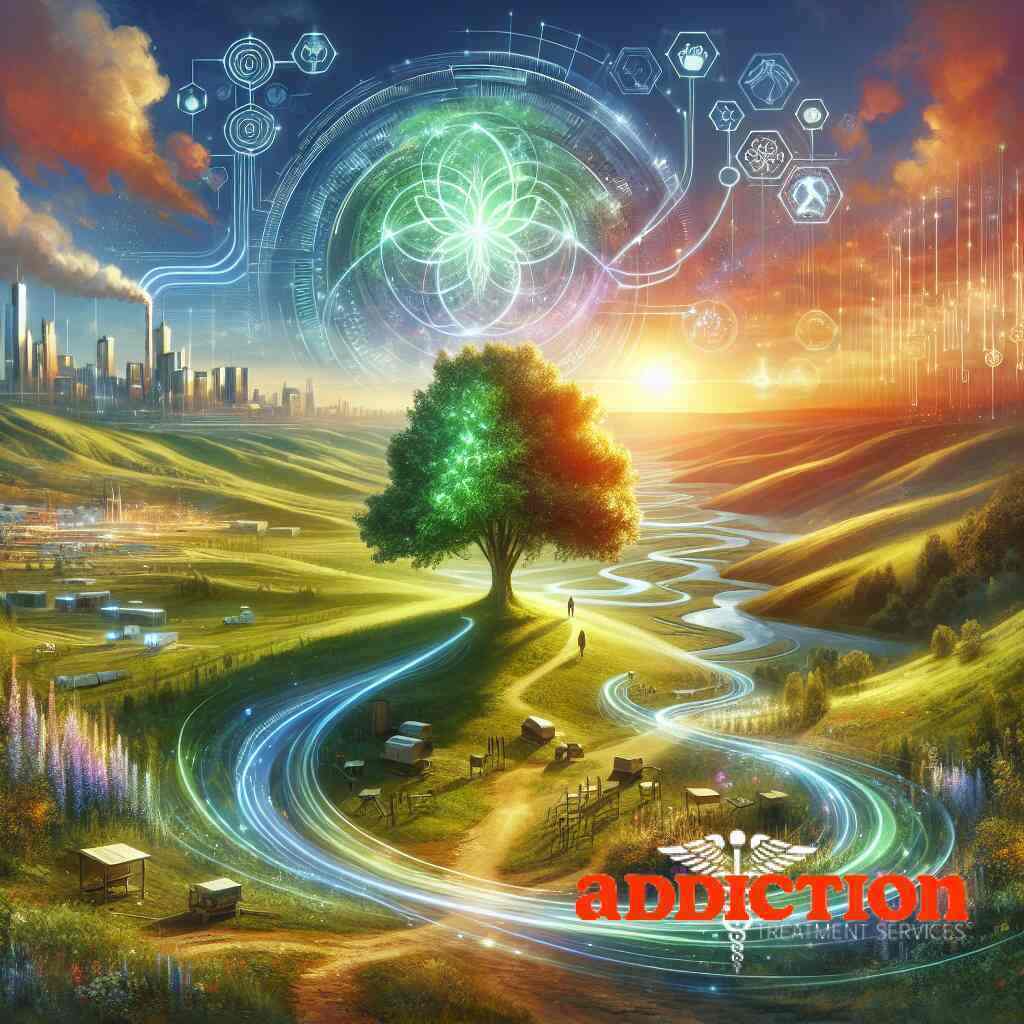 Posted On: 09/07/2024
Posted On: 09/07/2024Understanding Addiction and Its Impact
Defining Substance Use Disorders
Substance Use Disorders (SUDs) are complex conditions characterized by the excessive use of one or more substances, leading to significant clinical and functional impairment. This can include health problems, disability, and failure to meet major responsibilities at work, school, or home. According to the American Psychiatric Association, SUDs affect an individual’s brain and behavior, leading to an inability to control the use of legal or illegal drugs, alcohol, and medications. Signs of the disorder might vary depending on the substance, the amount of substance used, and the duration of the addiction.
The Science of Addiction
Addiction is deeply rooted in the brain’s pathways, affecting the reward, motivation, and memory functions. Research indicates that drugs and alcohol alter the brain’s neurotransmitter activity, leading to an artificial sense of pleasure or calm, which encourages repeated use. Over time, the individual’s ability to choose not to use substances is impaired, leading to the compulsive behaviors seen in addiction. The science of addiction shows that while the initial decision to use drugs or alcohol is voluntary for most people, the brain changes that occur over time challenge an addicted person’s self-control and hinder their ability to resist intense impulses to take drugs.
Consequences of Untreated Addiction
The consequences of untreated addiction extend far beyond the individual, affecting families, communities, and society as a whole. Health issues can range from mental health disorders, such as depression and anxiety, to physical health problems, including heart disease, liver failure, and overdose. Untreated addiction can also lead to legal issues, financial problems, and a breakdown in social and familial relationships. Furthermore, it contributes to societal problems like increased crime rates and homelessness. This broad impact underscores the importance of seeking early and effective treatment to mitigate these extensive consequences.
Exploring Treatment Options for Drug Addiction
Medication-Assisted Treatment (MAT)
Medication-assisted treatment (MAT) is a highly effective approach to managing substance use disorders, especially for opioids. By integrating FDA-approved medications with counseling and behavioral therapies, MAT addresses the whole patient. Medications like methadone, buprenorphine, and naltrexone help reduce withdrawal symptoms and cravings, providing a stable platform for recovery. Counseling sessions complement the pharmacological aspects by tackling the psychological dependencies on substances. This dual approach ensures that individuals have the best chance of rebuilding their lives. Explore the benefits of MAT in more detail.
Residential Addiction Treatment
Residential treatment centers offer a structured environment that can be vital for individuals in the early stages of recovery. These facilities provide around-the-clock care in a non-hospital setting, where individuals can live while receiving treatment. The advantages of residential care include a comprehensive approach that addresses the medical, psychological, and social factors of addiction. With access to mental health professionals and various therapy formats, patients can immerse themselves in their recovery without the distractions of everyday life.
Outpatient Addiction Programs
Outpatient treatment programs offer flexibility and are suited for individuals with less severe forms of addiction and strong support networks-Outpatient Care in Texas. Patients can live at home and continue with their daily activities while attending treatment sessions scheduled around their regular commitments. Services can range from drug education classes to intensive outpatient programs (IOPs) that resemble residential treatment intensity but on a part-time basis. Intensive outpatient program exploration reveals how IOP can be an effective step down from residential treatment or a standalone option, depending on the individual’s circumstances.
Detoxification Services
Detoxification is the first crucial step in the addiction treatment process for many people. Ultimate Guide to Detox Services in California. It involves medically supervised withdrawal from drugs, ensuring the individual’s safety while minimizing withdrawal symptoms. Understanding drug detoxification shows that it can occur in various settings, from hospitals to outpatient clinics, depending on the substance and severity of addiction. This process cleanses the body of toxins but is most effective as the preliminary phase of a comprehensive treatment plan that includes further therapies for recovery.
Intensive Outpatient Program (IOP)
The Intensive Outpatient Program (IOP) offers a level of care that supports recovery while accommodating daily responsibilities. Ideal for those transitioning from inpatient treatment or needing a structured program, IOP involves multiple sessions per week, focusing on relapse prevention, coping strategies, and social support systems. Details on IOP highlight its emphasis on group therapy, individual counseling, and, in some cases, medication management, making it a versatile and effective option.
Holistic Addiction Therapies
Holistic therapies complement traditional addiction treatments by focusing on healing the mind, body, and spirit. Techniques such as yoga, meditation, acupuncture, and art therapy can enhance recovery by reducing stress, improving mental health, and boosting physical well-being. These therapies aim to treat the underlying causes of addiction, offering a rounded approach that empowers individuals to maintain sobriety through self-awareness and healthy coping mechanisms.
Dual Diagnosis Treatment
Dual diagnosis treatment is essential for individuals facing concurrent substance use and mental health disorders. This specialized care tackles both issues simultaneously, recognizing that untreated mental health issues can impede addiction recovery. Therapies are designed to manage symptoms of mental health disorders while addressing addiction, providing a comprehensive strategy to enhance the overall treatment outcome. Tailoring treatment to meet both challenges head-on ensures a more effective and sustainable path to recovery.
The Role of Counseling in Addiction Recovery
Individual Counseling Services
Individual counseling stands as a cornerstone of addiction treatment, providing a confidential space for those in recovery to explore the root causes of their substance use disorders. In these one-on-one sessions, mental health professionals in addiction work closely with clients to identify and address the psychological, emotional, and behavioral issues that contribute to addiction. Tailored to meet each person’s unique needs, these therapeutic sessions can cover a range of topics, including stress management, self-esteem, and addressing any co-occurring mental health conditions. The personalized nature of individual counseling services ensures that each client receives targeted support, facilitating a deeper understanding of their addiction and laying the groundwork for sustained recovery.
Family and Group Therapy
Family and group therapy sessions play a pivotal role in the addiction recovery process, offering supplementary perspectives and support networks beyond individual counseling. Family therapy helps mend and strengthen family relationships that may have been strained by addiction, fostering a supportive home environment conducive to recovery. Meanwhile, group therapy provides a platform for individuals to share experiences and coping strategies, building a sense of community and mutual support among peers facing similar challenges. Engaging in these collective forms of therapy enhances the overall treatment experience, providing emotional reinforcement and promoting healing within relationships affected by substance misuse.
Behavioral Health Services for Addiction
Behavioral health services for addiction encompass a wide array of therapeutic approaches designed to modify addictive behaviors and develop healthier coping mechanisms. Through interventions such as Cognitive Behavioral Therapy (CBT) and Dialectical Behavior Therapy (DBT), clients learn to recognize and alter thought patterns and behaviors that lead to substance use. These therapies emphasize skill-building in areas such as emotional regulation, stress tolerance, and interpersonal effectiveness, equipping individuals with the tools necessary to navigate the challenges of recovery. The integration of behavioral health services into addiction treatment plans ensures a comprehensive approach, addressing both the psychological aspects of addiction and the practical skills needed for a successful recovery.
Developing Coping Strategies and Relapse Prevention
Developing effective coping strategies is essential for navigating the triggers and stresses that can lead to relapse. Addiction recovery programs often include relapse prevention planning as a key component, helping individuals recognize the signs of relapse and implement strategies to maintain sobriety. Relapse prevention strategies are essential, such as identifying high-risk situations, enhancing self-care practices, and utilizing support networks, which are crucial for sustaining long-term recovery. By equipping clients with a comprehensive set of relapse prevention tools, addiction treatment services empower individuals to manage their recovery proactively, reducing the risk of relapse and supporting a life of sobriety.
Navigating the Journey to Recovery
Creating a Personalized Recovery Plan
The path to overcoming substance use disorders varies significantly among individuals, emphasizing the necessity of a personalized recovery plan. Addiction Treatment Services recognizes this need, offering guidance on tailoring a recovery strategy that aligns with the unique circumstances, preferences, and goals of each person. A personalized plan may encompass a variety of treatment modalities, from medication-assisted treatment for withdrawal management to intensive psychotherapy for underlying psychological issues. The incorporation of holistic addiction therapies can further enrich the recovery process, addressing the individual’s mental, physical, and spiritual well-being. Crafting this customized plan is a critical first step in in setting a firm foundation for a successful recovery journey.
The Importance of Support Services
Support services play a pivotal role in sustaining recovery by offering emotional, logistical, and educational assistance Recovery Support Services. Addiction Treatment Services emphasizes the critical nature of these services, which range from sober living environments facilitated by places like the Reco Institute for sober living options to peer support groups that foster a sense of belonging and mutual understanding. Access to robust support services can significantly impact the efficacy of the recovery process, helping individuals navigate challenges and celebrate milestones along the way. This broad spectrum of support underscores the interconnectedness of recovery, where practical aids, community engagement, and emotional support coalesce to guide the individual toward long-lasting sobriety.
Early Intervention for Substance Abuse
The significance of early intervention in substance abuse cannot be overstated. Identifying and addressing substance misuse at its nascent stages can prevent the escalation of addiction, leading to more effective outcomes. Addiction Treatment Services offers resources and guidance on recognizing the early signs of substance abuse and taking proactive steps. Early intervention programs may include education on substance use, access to counseling, and engagement in preventative therapies. By acting swiftly, individuals can circumvent the profound impacts of addiction on their health, relationships, and quality of life. Emphasizing prevention, these early efforts can pave the way for a more hopeful and healthy future.
Engagement in Recovery Community and Support Groups (AA Meetings, NA Meetings)
Integration into a supportive community, including participation in recovery and support groups such as Alcoholics Anonymous and Narcotics Anonymous, is a cornerstone of effective addiction recovery. These groups offer a safe, non-judgmental space where individuals can share experiences, gain insights, and draw strength from others who have navigated similar paths. The Alcoholics Anonymous meetings finder and Narcotics Anonymous Meetings locator are invaluable tools for connecting individuals with these vital sources of support. Engagement in these communities encourages accountability, enhances motivation, and provides a powerful reminder of the possibility of recovery. Through regular participation, individuals can build a resilient network of peer support, which is critical for navigating the ups and downs of the recovery journey.
Specialized Programs and Strategies
Gender-Specific Treatment Options
Gender-specific treatment programs acknowledge the unique challenges and circumstances faced by men and women in addiction recovery. These programs create a supportive environment where individuals can discuss sensitive topics and experiences related to their gender and substance use without discomfort or fear of judgment. For women, topics might include trauma related to past domestic violence or parenting concerns, while men’s groups might focus on societal pressures and emotional expression. Tailoring treatment to address these gender-specific issues not only enhances comfort and openness but can significantly improve outcomes by addressing the root causes of addiction in a more personalized manner.
Programs for Adolescents and Young Adults
Adolescents and young adults grappling with substance use disorders face distinctly different challenges compared to their adult counterparts. Acknowledging this, specialized treatment programs for this demographic incorporate educational components and life skills training alongside traditional therapy. These programs often emphasize family involvement, peer relationships, and the development of healthy social networks. Educational support ensures that young people in recovery don’t fall behind academically, providing a sense of normalcy and direction. By blending age-appropriate interventions with elements of fun and engagement, these programs strive to make recovery an empowering experience that sets the foundation for a lifetime of sobriety.
Cultural and Spiritual Considerations in Treatment
Recognizing and honoring cultural and spiritual beliefs within addiction treatment services can significantly influence an individual’s journey to recovery. Programs that integrate cultural and spiritual practices offer a more holistic approach, acknowledging the powerful role these elements play in many people’s lives. From incorporating Native American healing practices to offering faith-based counseling for those from Christian, Jewish, Islamic, or other religious backgrounds, these tailored treatments provide comfort and familiarity, fostering a deeper sense of meaning and purpose in recovery. Respect for diverse cultural backgrounds and spiritual beliefs helps create a more inclusive and supportive recovery environment, encouraging personal growth and healing on all levels.
Techniques for Managing Withdrawal Symptoms
Managing withdrawal symptoms effectively is crucial for the success of addiction treatment and recovery. Specialized strategies and psychotherapy in addiction recovery help manage these sometimes intense and uncomfortable symptoms, ensuring the individual’s safety and comfort. Medical detoxification programs use medication-assisted treatment (MAT) to alleviate physical symptoms, while various psychotherapeutic approaches, such as Cognitive Behavioral Therapy (CBT) and mindfulness practices, support individuals through psychological withdrawal. Building a comprehensive toolkit for withdrawal management, including education on what to expect, relaxation techniques, and coping strategies, empowers individuals to navigate this challenging phase with resilience and confidence. Engaging in therapies that treat both the body and mind ensures a more humane and effective approach to overcoming the physical dependence associated with substance use disorders.
Prevention, Education, and Ongoing Efforts
Substance Abuse Prevention Programs
Preventing drug addiction before it begins is a critical component of the overall fight against substance use disorders. Substance Abuse Prevention Programs are designed to educate individuals, especially youths, about the dangers of drug use and ways to avoid succumbing to peer pressure. These programs often employ evidence-based strategies that combine education with interactive components, such as role-playing scenarios and group discussions, to enhance their effectiveness. By targeting schools, communities, and families, prevention programs aim to create environments that support healthy choices and resist the lure of drugs. The goal is to instill resilience and provide the tools necessary for individuals to make informed decisions about substance use, laying a foundation for a drug-free life.
Addiction Education for the Community
Education plays a vital role in demystifying addiction and correcting misconceptions surrounding substance use disorders. Addiction education for the community involves disseminating accurate information about the nature of addiction, its psychological and physical effects, and the realities of the recovery process. Workshops, seminars, and addiction treatment services blogs serve as platforms to enlighten the public, foster empathy, and reduce the stigma associated with drug addiction. By investing in education, communities become better equipped to support individuals struggling with addiction and encourage those affected to seek help sooner. This communal approach not only aids in prevention but also strengthens the network of support essential for recovery.
The Role of Family and Society in Recovery
Family and societal support are cornerstone elements in the journey of recovery from drug addiction. The role of family extends beyond providing emotional reassurance; it includes participating in therapy sessions, understanding the challenges of recovery, and creating a stable environment conducive to sobriety. Society’s role is equally critical, encompassing public policy, access to care, and societal attitudes toward addiction. Programs that foster family involvement and advocate for societal changes in perception and policy play a crucial role in making the path to recovery less isolating. Engaging families and mobilizing societal resources toward supportive infrastructure significantly enhances the chances of successful recovery and reintegration.
Ongoing Recovery and Relapse Prevention Strategies
The path to recovery from drug addiction is a continuous journey marked by personal growth and occasional challenges. Ongoing recovery and relapse prevention strategies are critical for maintaining sobriety in the long term. These strategies include developing a robust personal support system, engaging in regular counseling or therapy sessions, and participating in support group meetings such as AA Meetings and NA Meetings. Education on recognizing the signs of potential relapse, coupled with coping mechanisms to deal with stressors and triggers, empowers individuals to navigate their lives while maintaining their sobriety. The integration of relapse prevention into recovery plans underscores the understanding that recovery is not a destination but an ongoing process of healing and self-discovery.
Finding the Right Treatment Facility
Questions to Ask When Choosing a Facility
Choosing the right addiction treatment facility is a pivotal step in the recovery journey, requiring careful consideration to ensure it meets the individual’s specific needs. Important questions to ask include the types of addiction treatment services offered, the qualifications of the staff, and the success rates of their treatment programs. Inquire about the availability of medication-assisted treatment (MAT) and whether the facility provides support for co-occurring mental health disorders. Understanding the facility’s approach to recovery, whether it incorporates holistic therapies alongside traditional treatments, can also guide your decision-making process. Additionally, ask about the facility’s policies regarding family involvement in the recovery process, as this can be crucial for some individuals. Lastly, financial considerations, such as insurance acceptance and payment plans, should also be discussed to ensure the chosen facility aligns with your budgetary constraints.
Understanding the Levels of Care in Treatment Facilities
Addiction treatment facilities offer various levels of care, each designed to meet different needs along the recovery spectrum. Understanding these levels is crucial for selecting a treatment program that will offer the best chance of long-term success. Detoxification services provide a supervised setting for safely managing withdrawal symptoms at the start of recovery. Residential treatment, or inpatient care, offers 24-hour support and structured treatment programs for those with severe addictions. Outpatient treatment programs vary in intensity, from Intensive Outpatient Programs (IOP) that support recovery while allowing participants to live at home to less intensive options that might focus on drug education and support. Some facilities also offer partial hospitalization programs (PHPs), which provide a higher level of care than IOPs but do not require overnight stays. Understanding these options and discussing them with a professional can help determine the most appropriate level of care for your situation.
Addiction Treatment Services Directory: A Tool for Finding Local Centers
Finding the right addiction treatment center can feel overwhelming due to the wide variety of options available across the United States. The Addiction Treatment Services Directory simplifies this search by offering a comprehensive guide to local treatment centers. Whether you’re searching for an addiction treatment center: Reco Intensive, residential facilities, or outpatient care, this directory provides pertinent details, including services offered, treatment philosophies, and contact information. By utilizing this resource, individuals and families can more easily navigate the complex landscape of addiction treatment services, ensuring they find a facility that aligns with their specific needs and recovery goals.
The Importance of Accreditation and Quality Assurance
Accreditation is a mark of quality that indicates a treatment facility meets or exceeds strict standards of care and operational excellence. When a facility is accredited, it assures that its programs and services are consistently reviewed and approved by a reputable third-party organization. This level of scrutiny ensures that the treatments provided are evidence-based, ethical, and effective. Accreditation agencies, such as The Joint Commission or the Commission on Accreditation of Rehabilitation Facilities (CARF), assess everything from program methodologies to staff qualifications and safety protocols. Selecting an accredited facility offers peace of mind that the care received will be of the highest standard. Moreover, understanding a facility’s approach to quality assurance, including methods for measuring and improving client outcomes, can further inform your choice. Ensuring your selected treatment facility places a strong emphasis on quality care will support a more effective and supportive recovery experience.
Frequently Asked Questions
Question: What types of medication-assisted treatment do Addiction Treatment Services offer for drug addiction recovery?
Answer: Addiction Treatment Services connects individuals with a wide range of medication-assisted treatment options, which are crucial for managing withdrawal symptoms and reducing cravings in drug addiction recovery. This includes FDA-approved medications such as methadone, buprenorphine, and naltrexone, integrated with counseling and behavioral therapies to provide a comprehensive approach to substance use disorder treatment. By addressing both the physical and psychological facets of addiction, our directory helps you find specialized facilities offering the support necessary for a successful recovery journey.
Question: How can I find reputable residential addiction treatment centers near me through Addiction Treatment Services?
Answer: Addiction Treatment Services simplifies the process of locating reputable residential addiction treatment facilities near you. By utilizing our comprehensive addiction treatment services directory, individuals seeking help can easily access a curated list of accredited facilities across all 50 states. Our platform ensures that the centers we feature offer evidence-based addiction treatment programs, providing a supportive, structured environment necessary for the intensive care that residential treatment entails. Visit our website and use our user-friendly search feature to find high-quality, personalized recovery options in your area.
Question: What role do outpatient addiction programs play in the recovery process for drug addiction, and how can I find one that suits my needs?
Answer: Outpatient addiction programs play a crucial role in the drug addiction recovery process by offering flexibility to individuals who have commitments such as work or family. These programs, ranging from less intensive drug education classes to more intensive outpatient programs (IOPs) that mimic the intensity of residential care, allow patients to live at home while receiving treatment. Addiction Treatment Services provides a directory that helps you find outpatient programs tailored to your specific situation, ensuring you receive the right level of care and support necessary for your recovery journey. Our resources are designed to guide you toward programs that effectively balance your daily responsibilities with your recovery needs.
Question: In the blog titled “What Are Some Treatment Options for Those That Are Addicted to Drugs?” It mentions holistic addiction therapies. Can Addiction Treatment Services recommend centers that offer these?
Answer: Yes, Addiction Treatment Services recognizes the vital role holistic addiction therapies play in the recovery journey. We believe in a comprehensive approach to substance abuse recovery, including the healing of mind, body, and spirit. Through our extensive directory, we can connect you with treatment centers specializing in holistic therapies, such as yoga, meditation, acupuncture, and art therapy. These centers understand the importance of addressing the underlying causes of addiction and fostering sustainable, healthy lifestyle changes. By incorporating these therapies into a personalized recovery plan, individuals can find balance and enhance their overall well-being on the path to sobriety.
Question: How do Addiction Treatment Services help individuals with dual diagnoses find the right treatment facility?
Answer: Addiction Treatment Services is deeply committed to assisting individuals with a dual diagnosis dealing with substance use disorders alongside mental health issues with accurate and effective treatment. Acknowledging the complexity of dual diagnosis, we ensure our directory features specialized treatment facilities that offer integrated, cohesive care. These programs are designed to address both conditions simultaneously with a multidisciplinary approach, combining medication management, psychotherapy, and support services. Our goal is to make it easier for you to discover facilities that are equipped to navigate the intricacies of dual diagnosis, ensuring a more effective and sustainable recovery by tackling all aspects of your health.
Question: Can Addiction Treatment Services assist with finding treatment facilities that use evidence-based addiction treatment methods?
Answer: Absolutely. Addiction Treatment Services is dedicated to identifying and recommending treatment facilities that employ evidence-based addiction treatment methods. We understand the importance of substantiated, research-driven approaches in ensuring the effectiveness of drug addiction recovery programs. Our carefully curated directory includes facilities that utilize evidence-based practices, such as Cognitive Behavioral Therapy (CBT), Dialectical Behavior Therapy (DBT), and other proven interventions. By focusing on centers that adhere to these methodologies, we help ensure that individuals receive the highest standard of care designed to foster successful, long-lasting recovery.




